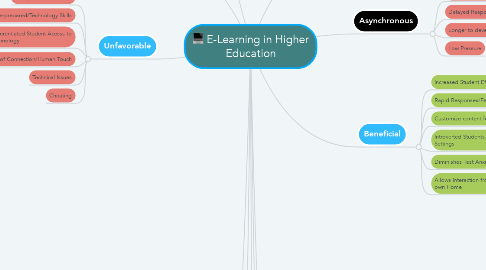E-Learning in Higher Education
by Rachel Acosta

1. Learning Preferences/Engagement
1.1. Acheampong, N. A. A. (2021). Reward Preferences of the Youngest Generation: Attracting, Recruiting, and Retaining Generation Z into Public Sector Organizations. Compensation & Benefits Review, 53(2), 75–97. https://doi.org/10.1177/0886368720954803
1.2. Seemiller, C., & Grace, M. (2017). Generation Z: Educating and Engaging the Next Generation of Students. About Campus, 22(3), 21–26. https://doi.org/10.1002/abc.21293
1.3. Weber, K. M., & Keim, H. (2021). Meeting the Needs of Generation Z College Students through Out-of-Class Interactions. About Campus, 26(2), 10–16. https://doi.org/10.1177/1086482220971272
2. First Generation College Students
2.1. Pike, G., & Kuh, G. (2005). First- and Second-Generation College Students: A Comparison of Their Engagement and Intellectual Development. The Journal of Higher Education, 76(3), 276-300. Retrieved June 10, 2021, from http://www.jstor.org/stable/3838799
2.2. Wilbur, T. G., & Roscigno, V. J. (2016). First-generation Disadvantage and College Enrollment/Completion. Socius. https://doi.org/10.1177/2378023116664351
3. Typical E-Learning
3.1. Content Focused
3.2. Attendance Driven
3.3. One size fits all
3.4. Efficient for Authors
4. Serious E-Learning
4.1. Performance Focused
4.2. Meaningful to Learners
4.3. Engagement Driven
4.4. Individualized Challenges
5. Unfavorable
5.1. Heavy Reliance on Text
5.2. Underprepared/Technology Skills
5.3. Differentiated Student Access to Technology
5.4. Low levels of Connection/Human Touch
5.5. Technical Issues
5.6. Cheating
6. Generation Z Students in College
7. The Future of Gen Z
7.1. Crappell, C. (2013). The ABCs of Gen X, Y(P), Z: A Column for Young Professionals: Preparing Gen Z Students For Effective Practice. American Music Teacher, 63(1), 12-17. Retrieved June 10, 2021, from http://www.jstor.org/stable/43543631
7.2. Crappell, C. (2017). The ABCs of Gen X, Y(P), Z: A Column for Young Professionals: Discovering Best Practices By Studying Generational Learning Preferences, Part I. American Music Teacher, 67(3), 42-44. Retrieved June 10, 2021, from The ABCs of Gen X, Y(P), Z on JSTOR
7.3. Willis, J. (2011). The Ne(x)t Generation. Phalanx, 44(2), 36-36. Retrieved June 10, 2021, from http://www.jstor.org/stable/24910565
8. Ethical Behaviors
8.1. Flom, J., Green, K., & Wallace, S. (2021). To cheat or not to cheat? An investigation into the ethical behaviors of generation Z. Active Learning in Higher Education. https://doi.org/10.1177/14697874211016147
9. Parenting Styles
9.1. Oerther, S., & Oerther, D. B. (2021). Review of Recent Research about Parenting Generation Z Pre-Teen Children. Western Journal of Nursing Research. https://doi.org/10.1177/0193945920988782
10. Synchronous
10.1. Hybrid/Mixed-Mode
10.2. Zoom/Skype Meetings
10.3. Chemistry/Rapport
10.4. Real Time Interactions
11. Asynchronous
11.1. Schedule Flexibility
11.2. Delayed Responses
11.3. Longer to develop rapport
11.4. Low Pressure
12. Beneficial
12.1. Increased Student Effort
12.2. Rapid Responses/Feedback
12.3. Customize content for Different Learners
12.4. Introverted Students Thrive in Online Settings
12.5. Diminishes Test Anxiety
12.6. Allows Interaction from Comfort of one's own Home


